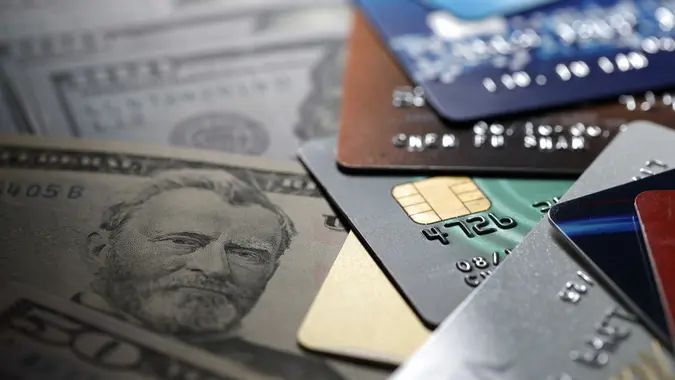Advertiser Disclosure
GOBankingRates works with many financial advertisers to showcase their products and services to our audiences. These brands compensate us to advertise their products in ads across our site. This compensation may impact how and where products appear on this site. We are not a comparison-tool and these offers do not represent all available deposit, investment, loan or credit products.
6 Steps To Take Immediately If Someone Opens a Credit Card in Your Name
 Written by
Andrew Lisa
Written by
Andrew Lisa
 Edited by
Molly Sullivan
Edited by
Molly Sullivan

Commitment to Our Readers
GOBankingRates' editorial team is committed to bringing you unbiased reviews and information. We use data-driven methodologies to evaluate financial products and services - our reviews and ratings are not influenced by advertisers. You can read more about our editorial guidelines and our products and services review methodology.

20 YearsHelping You Live Richer

Reviewed by Experts

Trusted by Millions of Readers
Few things are more frightful and frustrating than realizing that someone has stolen your identity and opened a credit card in your name — but if it happens to you, you don’t have time for emotion. Every moment you spend stewing over the violation you’ve just suffered is a moment that an identity thief could be wreaking havoc on your finances and your credit. You need to act fast by doing the right things in the right order.
Here’s your plan of action.
1. Alert the Card Issuer’s Fraud Department
The sooner you notify the credit card issuer’s fraud department about potential identity theft, the more likely it is that you’ll avoid lasting damage to your finances or credit. Experian advises you to keep records of who you spoke with and when you called — the process will likely involve multiple communications — and to write down what the fraud agent tells you.
You must be on the record early to protect yourself later if a criminal does rack up charges in your name, and the sooner you involve the bank’s fraud team, the quicker they’ll launch an investigation and hopefully prevent that from ever happening.
2. Change Your Passwords
If a criminal has enough of your information to open a credit card in your name, your other accounts are probably compromised too — or soon will be. Change your passwords on all your sensitive accounts right away to prevent another attack.
Credit Karma recommends using a password generator instead of choosing a password of your own. Apps like LastPass are designed for that purpose specifically.
3. Examine and Lock Your Credit Report
With the bank’s fraud unit on the case and your other passwords protected, now is the time to contact all three credit bureaus’ fraud departments.
Report the issue and ask for a copy of your credit report, which you’ll need to examine for accounts you didn’t open, credit cards you didn’t apply for and loans you didn’t take out.
While you’re there, lock your report to freeze your credit. This prevents your information from being used again without your consent. You can unfreeze at any time either completely or on a case-by-case basis.
Here is the contact info for all three bureaus:
4. Notify Your Other Financial Institutions
Whether or not you find any discrepancies in your credit report, it’s a good idea to call all of your card issuers, your bank, credit union and any other financial institution that are part of your life, according to TD Bank.
It’s important to tell them that you don’t have a reason to suspect fraud with your account with them, but that it’s possible that an identity thief might have your personal data.
5. Report the Incident to the FTC
The Federal Trade Commission (FTC) has a special bureau that exists to handle identity theft cases. Visit IdentityTheft.gov, where the FTC makes it easy to report what happened and get a recovery plan to begin managing the situation.
6. Set Up a Fraud Alert
For an extra layer of protection, you might want to set up a fraud alert with the three credit bureaus — all you have to do is notify one, and that one will pass on your case to the other two on your behalf.
Fraud alerts make it harder for criminals to open accounts in your name by requiring businesses and lenders to take extra steps to authenticate your identity before issuing you credit.
Fraud alerts last for one year, but a seven-year option is available for those who have reports from law enforcement or the FTC that document their status as a victim of identity theft.
Share This Article:




You May Also Like




Experts Warn Consumers Could Pay More If 10% Credit Card Cap Limits Rewards and Raises Other Fees
January 14, 2026
4 min Read



3 Ways Trump's Credit Card Plan Could Have Major Consequences for Your Money
January 13, 2026
4 min Read

What Would Happen if Americans Stopped Using Credit Cards? ChatGPT Reveals 5 Major Economic Shifts
January 09, 2026
4 min Read




Here's Why You Should Never Use a Debit Card, According to Codie Sanchez
December 16, 2025
4 min Read




Make your money work for you
Get the latest news on investing, money, and more with our free newsletter.
By subscribing, you agree to our Terms of Use and Privacy Policy. Unsubscribe at any time.


Thanks!
You're now subscribed to our newsletter.
Check your inbox for more details.



Sending you timely financial stories that you can bank on.
Sign up for our daily newsletter for the latest financial news and trending topics.
For our full Privacy Policy, click here.
Looks like you're using an adblocker
Please disable your adblocker to enjoy the optimal web experience and access the quality content you appreciate from GOBankingRates.
- AdBlock / uBlock / Brave
- Click the ad blocker extension icon to the right of the address bar
- Disable on this site
- Refresh the page
- Firefox / Edge / DuckDuckGo
- Click on the icon to the left of the address bar
- Disable Tracking Protection
- Refresh the page
- Ghostery
- Click the blue ghost icon to the right of the address bar
- Disable Ad-Blocking, Anti-Tracking, and Never-Consent
- Refresh the page


